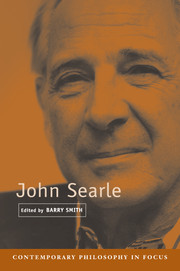Book contents
- Frontmatter
- Contents
- List of Contributors
- 1 John Searle: From Speech Acts to Social Reality
- 2 From Speech Acts to Speech Activity
- 3 Intentions, Promises, and Obligations
- 4 Law
- 5 Action
- 6 Consciousness
- 7 The Intentionality of Perception
- 8 Sense Data
- 9 The Limits of Expressibility
- 10 The Chinese Room Argument
- 11 Searle, Derrida, and the Ends of Phenomenology
- Further Reading
- Index
3 - Intentions, Promises, and Obligations
Published online by Cambridge University Press: 05 June 2012
- Frontmatter
- Contents
- List of Contributors
- 1 John Searle: From Speech Acts to Social Reality
- 2 From Speech Acts to Speech Activity
- 3 Intentions, Promises, and Obligations
- 4 Law
- 5 Action
- 6 Consciousness
- 7 The Intentionality of Perception
- 8 Sense Data
- 9 The Limits of Expressibility
- 10 The Chinese Room Argument
- 11 Searle, Derrida, and the Ends of Phenomenology
- Further Reading
- Index
Summary
In a long and fruitful career, John Searle has, in a courageous but at the same time somewhat maverick fashion, campaigned against fashionable and unfashionable views alike. An exhaustive list of the battles Searle has fought would be far too long for my purposes here, but its more prominent items would have to include his campaigns against functionalism and physicalism in the philosophy of mind, against classical formulations of the mind/body problem, against the very idea of artificial intelligence, against the supposed gap between ‘is’ and ‘ought’, against understanding language as merely the manipulation of signs, against the classical model of rationality, and against the standard conceptions of social philosophy as a wholly owned subsidiary of political philosophy. Searle has, famously, devised clever thought experiments and hard-hitting arguments that seem, on first approximation, to suggest a somewhat piecemeal, playful approach. Under more careful consideration, however, it becomes clear that Searle's academic endeavors are integrated into a coherent whole, adding up to a comprehensive philosophical programme. Most recently, Searle himself has stated that his main preoccupation in philosophy is to answer the questions: “how do the various parts of the world relate to each other–how does it all hang together?”
Here I wish to investigate precisely the alleged comprehensiveness of Searle's philosophy, with special emphasis on his general social ontology, focusing on the three topics of intentions, promises, and obligations.
- Type
- Chapter
- Information
- John Searle , pp. 52 - 84Publisher: Cambridge University PressPrint publication year: 2003
- 3
- Cited by



